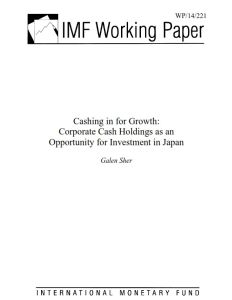Join getAbstract to access the summary!

Join getAbstract to access the summary!
Galen Sher
Cashing in for Growth
Corporate Cash Holdings as an Opportunity for Investment in Japan
IMF, 2014
What's inside?
Corporate cash hoarding could be holding back the Japanese economy.
Recommendation
It seems that, for Japanese firms, cash is king. By holding on to cash rather than investing it or distributing it in dividends, Japanese businesses could be stifling the economic growth that Abenomics is set on achieving. So why do Japanese companies continue to hold large amounts of cash, and what could loosen their purse strings? Though highly technical, this report from economics scholar Galen Sher offers noteworthy insights into how Japan could recharge its economy. getAbstract recommends it to economists, investors and analysts who are on Japan-watch.
Summary
About the Author
Galen Sher is a PhD candidate in economics at Oxford University.

















Comment on this summary